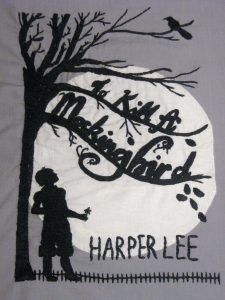By Melita Easters
Beginning with an AJC reporter mid-morning, many have asked today about my reaction to the death of Nelle Harper Lee because they know my play about her life was performed in Atlanta last summer.
 Most of us are introduced to Harper Lee and her Pulitzer Prize winning novel To Kill a Mockingbird with its lessons about tolerance and justice during our transformative middle school years when we first begin to express independent opinions about the world.
Most of us are introduced to Harper Lee and her Pulitzer Prize winning novel To Kill a Mockingbird with its lessons about tolerance and justice during our transformative middle school years when we first begin to express independent opinions about the world.
Her “passing” comes at a time when our nation finds itself sharply divided along political, religious and racial lines. We are like that line in Mockingbird: we “generally see what we look for and hear what we listen for.” We sort ourselves into convenient circles of friendship amongst those who vote and pray as we do or who feel the same way about child rearing, global warming and choices in literature.
I have studied Miss Lee and both her books carefully. The “second” novel, Go Set a Watchman, which was really an early draft of To Kill a Mockingbird, ignited heated discussions during the summer of 2015 about whether the beloved character Atticus was a racist.
Somehow last summer it was easier to discuss the racial attitudes of a fictional character in a South Alabama story set decades before than to look around and examine what in our current culture could produce a young man who could walk in to Charleston’s Emanuel AME church to kill nine people with hopes of inciting a “race war.”
It was easier to talk about Atticus than to watch the South Carolina legislature debate whether the Confederate flag should still fly over the Capitol. A conversation about Atticus was easier than a conversation with the fella down the road or in the parking lot at a big box store who flys the Confederate flag from his front porch or has it spread across a gun rack in the back of a pickup.
If there is anything we could collectively do to honor the memory of Miss Lee, it might well be to take a page from her book when Atticus tells Scout:
You never really understand a person until you consider things from his point of view… Until you climb inside of his skin and walk around in it.
What if all of us climbed into the skin of someone with whom we disagreed? What if to honor Harper Lee and her literary legacy we all tried to re-learn those lessons of tolerance and understanding from our middle school English class?
What if we put those lessons into practice one understanding action at a time to clearly demonstrate tolerance and the common ground of our shared humanity?
Melita Easters is an Atlanta-based playwright. Her one-woman show, Nelle’s Story: The World of Harper Lee, debuted in 2012 and was reprised last year in conjunction with the release of Go Set a Watchman.

Credits:
Featured image from To Kill a Mockingbird via Wikimedia
Book cover To Kill a Mockingbird via Flickr CC
















